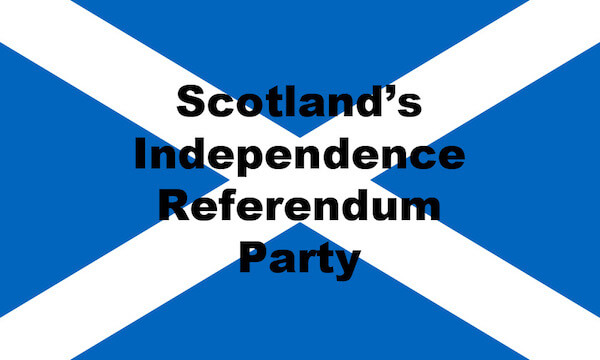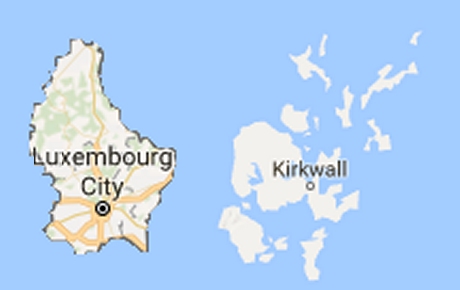 The Brit-Govt is refusing to publish its secret report showing Scotland will ‘lose most from Brexit’ – just like Brit-Govt refused to publish the famous McCrone report in 1975 showing that Scotland would become as rich as Norway on Independence.
The Brit-Govt is refusing to publish its secret report showing Scotland will ‘lose most from Brexit’ – just like Brit-Govt refused to publish the famous McCrone report in 1975 showing that Scotland would become as rich as Norway on Independence.
Mark R Whittet, Leader of Scotland’s Independence Referendum Party today calls for the UK government’s Department for Exiting the European Union (DExEU) to publish all analysis about the impact of Brexit on Scotland – following reports the department’s former Chief of Staff that bombshell findings have been withheld.
James Chapman, former adviser to the UK Govt Brexit Minister David Davis adviser asked why key “analysis” by DExEU – showing that Scotland (and the north east of England) will “lose most from Brexit” – has not been published.
Whittet said: “This is another classic example of London-based Unionist parties (that’s Labour, Tories and Liberals) withholding what should be public information from the people of Scotland and denying people that economic facts of life to suit their own party-partisan aims.
“Labour did it in first in 1975 when the UK government economist Professor Gavin McCrone analysed the effect of North Sea oil on the finances of a notional independent Scotland, which at the time seemed a real and possibly even imminent prospect.
McCrone’s assessment was so alarming to Westminster that its findings had to be kept secret from Scottish voters for more than 30 years.
“The Brit-govt must publish this document now – and tells us how much of an self-inflicted economic would that the Tory-led Brexit will be – instead of skulking behind a shady veil of secrecy until 2047.
“The Labour ban on the McCrone report failed then, and the Tory government’s ban on its Brexit report now will also fail to prevent Scotland taking its place in the international league of independent nations in a ‘Yes’ vote in Scotland’s second Independence Referendum.”
It is commonly calculated that a 5% share of the ‘list’ or second transferable vote for parties standing for election can get MSPs voted into Holyrood. By standing for election to Holyrood, Scotland’s Independence Referendum Party will ‘even up the score with the three Unionist parties by enabling SNP voters to cast their second, transferable vote in support of a (second) party (SIRP) which aims to achieve Scottish Independence.
NB
A well-known broadcasting company once asked: “Surely Scotland’s Independence Referendum Party is simply a single-issue protest party based in Edinburgh?”
Whittet: “There is no greater single issue facing Scotland and every Scot than independence. Independence is the over-arching policy that will enable us to work progressively towards a fairer, more equal and just society, where we can all share more fairly in the rewards of making Scotland a better place to be.
“Every other policy – health, economics, taxation, employment, immigration, social welfare – depends on first making Scotland Independent – and Scottish Independence is an issue which affects every neuk and crannie across the land – directly and/or indirectly”
![]()
The Too Wee Club #3
A series inspired by a Unionist blog insisting that “On a practical level, I do not believe for one moment that Scotland could thrive alone”, and which led to our thinking about some of the world’s other independent nations.
NO. 3 – LUXEMBOURG
Above is a picture of the Grand Duchy of Luxembourg in Central Europe. Below is what it would look like in terms of size if it was right next to Orkney.
Luxembourg isn’t just famous for its top-quality football teams. It’s a sovereign state which contains one of the three official capitals of the EU, as well as the seat of the European Court of Justice. But how does it compare to Scotland?
(All stats from link above unless linked separately.)
AREA: 999 square miles
(Scotland: 30,090 square miles)
POPULATION: 576,249
(Scotland: 5.4 million)
LARGEST CITY: Luxembourg City, pop. 107,247
(Scotland: Glasgow, pop. 603,000)
GROSS DOMESTIC PRODUCT (nominal): $60bn
(Scotland: $245bn)
GDP PER CAPITA: $104,359
(Scotland: $45,904)
GDP PER CAPITA (PPP measure): $100,991
(UK: $42,514)
GINI INEQUALITY RATING /100 (higher = more inequality): 28.5
(UK: 32.4)
UNEMPLOYMENT RATE: 6%
(UK: 4.5%)
W.H.O. PUBLIC HEALTHCARE QUALITY RANKING: 16th
(UK: 18th)
AVERAGE LIFE EXPECTANCY AT BIRTH: 80 (table A.17)
(UK: 80.7, Scotland 79.1)
UNIVERSITY EDUCATION: around 500 Euros a year
(Scotland: free. UK: £9,000 per annum)
INCOME TAX RATES (standard/higher/max): sliding scale from 0% to 49%
(Scotland: 20%/40%/45%)
ANNUAL MURDER RATE PER 100,000 OF POPULATION: 0.72
(UK: 0.92)
SIGNIFICANT NATURAL RESOURCES/INDUSTRIES: financial services
(Scotland: oil, whisky, renewables, fresh water, financial services, tourism)
Luxembourg has been a fully independent state for 127 years, and a member of NATO since its inception in 1949. The population is highly multilingual, with almost everyone speaking at least FOUR languages, and the country has an openly gay Prime Minister.
Luxembourg maintains free public education and high-quality state-funded healthcareat the point of delivery. It has a tiny army just 800 strong and (as a landlocked country) no navy. It is protected by NATO membership and its geographical location.
Unionists believe these achievements to be completely beyond the ability of the people of Scotland.
Readers can make their own judgements.


